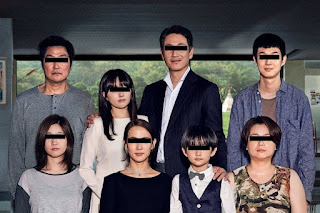It's official! Parasite pulled off the upset against the favorite, 1917. How a foreign film ended up winning the Best Picture, many are not sure, but the politics of the film could certainly be considered as it depicts many issues that resonate with people around the world, especially in the United States.
Many Best Picture winning films use some kind of political issue to unite around, and with Parasite, it seems that class consciousness, envy, and violent revolution seem to dominate. Using the left, center, right model, Parasite can easily be classified as "left" due to its Marxist nature and progressive claim for change.
First, Parasite's Marxist nature places it firmly on the left side of this model. It seems to me that it almost directly mirrors Karl Marx's work "The Communist Manifesto," which draws stark contrast between the working class, known as the "proletariat" and the wealthy class, known as the "bourgeoise." Marx theorizes that as the gap between these two classes begins to grow, there will be more and more civil unrest, leading to an eventual violent revolution led by the proletariat. This is almost exactly what happens in Parasite.
*Spoilers Ahead*
A family quite literally living in the basement of society decides they've had enough of the life they're living, and begin to revolt against the norms that have been established, taking advantage of the bourgeoise, or the wealthy Park family who are completely numb to the entire process. Not only that, but Ki-woo experiences a phenomenon which Marx refers to as "class consciousness," or becoming aware of what class you are a part of. On the top floor of the Park household, Ki-woo questions whether or not he belongs there, initiating a literal meaning, as well as a metaphorical class meaning. After this, all hell breaks loose. A man literally walks out of a BASEMENT (he's been stuck there for years) and starts stabbing people. This is a clear, hit you over the head metaphor for the Marxist revolution, which is clearly a left-leaning attribute.
Finally, there's a progressive claim for change. The film ends on a more depressing note, with the camera shifting back down to the basement, showing a Ki-woo's melancholy frown as he knows he'll likely never see his father again due to the events at the party. While many are moved to change after hearing an inspiring message, those inspiring messages are often born out of a more somber event.
In the end, Parasite is a left-leaning film through and through due to its Marxist message and call for change. I hope you all get a chance to see it, it was certainly deserving! I seriously commend a film to take such a risk in its message. The Marxist ideal is met with a lot of animosity in capitalist countries such as the US, so this was an incredibly brave reach by Bong Joon Ho.


No comments:
Post a Comment